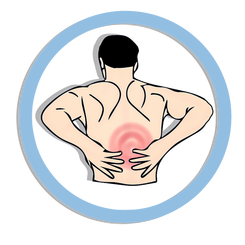
Low back pain is poorly treated according to a series of papers in the prestigious Lancet medical journal (1), which highlights that about nine million Britons suffer back pain but many receive drugs, surgery, and injections which can be useless or even harmful.
The evidence underpinning invasive treatments such as steroid injections and surgery is very weak and does not warrant using such techniques. Past studies have also shown that pain killers such as paracetamol or ibuprofen barely help relieve back pain.
A third of patients are then given stronger potentially dangerous opioids such as tramadol, codeine, and morphine which can end up making pain worse. Patients can also become hooked and suffer dangerous side-effects.
Herbal treatment could offer an alternative. Evidence is provided by a Cochrane review (2) which shows three herbal supplements to be effective in treating episodes of back pain. The herbs tested were oral administration of Harpagophytum procumbens (Devil’s Claw) and Salix alba (White Willow Bark), and topical application of Capsicum frutescens (Cayenne). The review contained ten randomized controlled trials that included 1567 adults with non-specific acute or chronic low back pain. All three herbs reduced pain in comparison to placebos.
The approach taken by a medical herbalist in treating back pain depends on the particular presentation of each individual. The aim is to reduce the inflammation, which causes the pain, with anti-inflammatory, analgesic herbs such as those described in the Cochrane report as well as ginger, turmeric and boswelia. These herbs would be combined with others that reduce muscle spasm and relax muscles, restore the function of injured nerves, and promote structural healing of muscles and connective tissues.
Herbs are well tolerated and not only relieve low back pain, but also promote healing without any negative side effects. This allows healing and long term recovery rather than just suppressing the pain.
Herbal treatment for back pain could be combined with the social and psychological approaches advocated in the Lancet studies without the use of ineffective or harmful drugs and surgery.
1. http://www.thelancet.com/series/low-back-pain (2018)
2. Gagnier, J.J., van Tulder, M.W., Berman, B.M., Bombardier, C. (2011) Herbal medicine low-back pain. Cochrane Summaries. http://summaries.cochrane.org/CD004504/herbal-medicine-for-low-back-pain
The evidence underpinning invasive treatments such as steroid injections and surgery is very weak and does not warrant using such techniques. Past studies have also shown that pain killers such as paracetamol or ibuprofen barely help relieve back pain.
A third of patients are then given stronger potentially dangerous opioids such as tramadol, codeine, and morphine which can end up making pain worse. Patients can also become hooked and suffer dangerous side-effects.
Herbal treatment could offer an alternative. Evidence is provided by a Cochrane review (2) which shows three herbal supplements to be effective in treating episodes of back pain. The herbs tested were oral administration of Harpagophytum procumbens (Devil’s Claw) and Salix alba (White Willow Bark), and topical application of Capsicum frutescens (Cayenne). The review contained ten randomized controlled trials that included 1567 adults with non-specific acute or chronic low back pain. All three herbs reduced pain in comparison to placebos.
The approach taken by a medical herbalist in treating back pain depends on the particular presentation of each individual. The aim is to reduce the inflammation, which causes the pain, with anti-inflammatory, analgesic herbs such as those described in the Cochrane report as well as ginger, turmeric and boswelia. These herbs would be combined with others that reduce muscle spasm and relax muscles, restore the function of injured nerves, and promote structural healing of muscles and connective tissues.
Herbs are well tolerated and not only relieve low back pain, but also promote healing without any negative side effects. This allows healing and long term recovery rather than just suppressing the pain.
Herbal treatment for back pain could be combined with the social and psychological approaches advocated in the Lancet studies without the use of ineffective or harmful drugs and surgery.
1. http://www.thelancet.com/series/low-back-pain (2018)
2. Gagnier, J.J., van Tulder, M.W., Berman, B.M., Bombardier, C. (2011) Herbal medicine low-back pain. Cochrane Summaries. http://summaries.cochrane.org/CD004504/herbal-medicine-for-low-back-pain
 RSS Feed
RSS Feed
